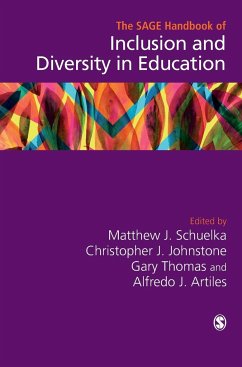
The SAGE Handbook of Comparative Studies in Education
Versandkostenfrei!
Versandfertig in 6-10 Tagen
133,99 €
inkl. MwSt.
Weitere Ausgaben:

PAYBACK Punkte
67 °P sammeln!
Educational practices have rapidly changed in the last few decades, especially in how exchanges of information and learning are delivered and processed. Yet, while the field of international comparative studies has grown, there has not been an extensive study on the relationship between educational practices, students, and how practitioners are prepared and trained. This handbook explores international educational practices and behaviours through new research and a review of existing research, with chapters spread across six parts:Part I: Introduction to Research Practices in Comparative Studi...
Educational practices have rapidly changed in the last few decades, especially in how exchanges of information and learning are delivered and processed. Yet, while the field of international comparative studies has grown, there has not been an extensive study on the relationship between educational practices, students, and how practitioners are prepared and trained. This handbook explores international educational practices and behaviours through new research and a review of existing research, with chapters spread across six parts:
Part I: Introduction to Research Practices in Comparative Studies of Education
Part II: Research Methods
Part III: Policy Transfer Research through International Comparisons
Part IV: Use of Student time in Formal and Informal Settings
Part V: School Practices from Early Childhood through Secondary School
Part VI: Conclusion - Lessons from Large Scale Studies
Part I: Introduction to Research Practices in Comparative Studies of Education
Part II: Research Methods
Part III: Policy Transfer Research through International Comparisons
Part IV: Use of Student time in Formal and Informal Settings
Part V: School Practices from Early Childhood through Secondary School
Part VI: Conclusion - Lessons from Large Scale Studies














